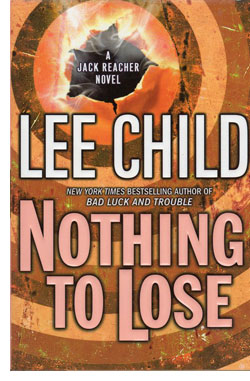 |
 Lee Child
Lee Child
Nothing to Lose
Delecourt Press / Bantam / Dell / Random House
US Hardcover First Edition
ISBN 978-0-385-34056-4
Publication Date: 06-03-2008
407 Pages; $27.00
Date Reviewed: 04-08-2008
Reviewed by: Terry D'Auray © 2008
Index:
Mystery
General Fiction
It's never too far from the start of any of Lee Child's Jack Reacher
novels before Jack hears the inevitable "You're under arrest".
'Nothing to Lose' is no exception – in fact, the arrest may be
even faster than normal – as Reacher finds himself between Hope
and Despair…Colorado (yes, they're both actual Colorado towns),
arrested for ordering coffee in a diner where he's obviously not welcomed.
Despair, while aptly named, is an ugly company town, ruled by a wealthy,
evangelical tycoon named Thurman, and populated by compliant, violent,
blue collar worker-thugs. Reacher is tried, convicted of vagrancy and
run out of town within just hours of his arrival. And, as is to be expected,
that doesn't sit well with him.
'Nothing to Lose' is Child's twelfth Jack Reacher novel and it plays
true to form. Reacher is the classic iconoclastic loner, traveling from
place to place with the clothes on his back, a folding toothbrush and
an ATM card (a relatively new addition to his gear). He's an ex MP,
well-trained in the techniques of war, observant, smart, big, and most
often, bad, occasionally very, very bad. Jack pursues things he finds
amiss, sometimes a slave to his own finely honed personal code of justice
and fairness, other times just plain cynically curious. And once he
sets out on a quest, he simply won't stop until he's reached the end,
no matter how nasty that might be.
Each Reacher novel has a similar structure. Something piques Jack's
interest, an unsettling something that's not quite as it should be.
As he attempts to unravel the puzzle, various unfriendly folks try to
dissuade him and, failing that, to scare him, hurt him, or, if need
be, kill him. Jack will have none of that! In 'Nothing to Lose' the
super fight scene (and there's always at least one truly fabulous fight
that stands out from the others, which are merely good) pits Jack against
six hulking, newly deputized townies in a bar fight that's a thing of
beauty (to read, at least; perhaps not as a participatory event). Jack,
armed with only his size and smarts, completely wipes out all six –
even the one with the knives – unassisted. He doesn't kill them
mind you, just renders them emergency-room fodder.
There's usually a woman in each Reacher novel, often a female cop, who's
got a mysterious something that is appealing but distancing. Vaughan,
the female police officer from the town of Hope, is intriguing, helpful,
sexy, and ultimately, noble but sad. She and Reacher bond briefly, but
both are far too savvy to hold expectations beyond the short term.
In 'Nothing to Lose' Child focuses on the underside of the U.S. military,
Homeland Security, and religious fanaticism in a complicated, but ultimately
satisfying story of power abused, people betrayed and killed by ideological
zealots in pursuit of an imagined apocalypse. Thematically, Child's
narratives are always relevant, believable, and fast-paced, told in
spare, clean language that's eminently readable. Be it action, exposition,
observation or rumination, Child's prose is up to the task.
The Reacher novels have built a devoted following since 1997 when 'Killing
Floor', the first book, was published in the US. While the books are
similar enough that a reader will know what they're getting, they're
each different enough to be engaging and relevant. All in all, I'm one
of the many who've found it pretty much impossible to pass up these
novels, and fortunately for his fans, Child gives us a Reacher fix on
a regular basis.
|
 |




